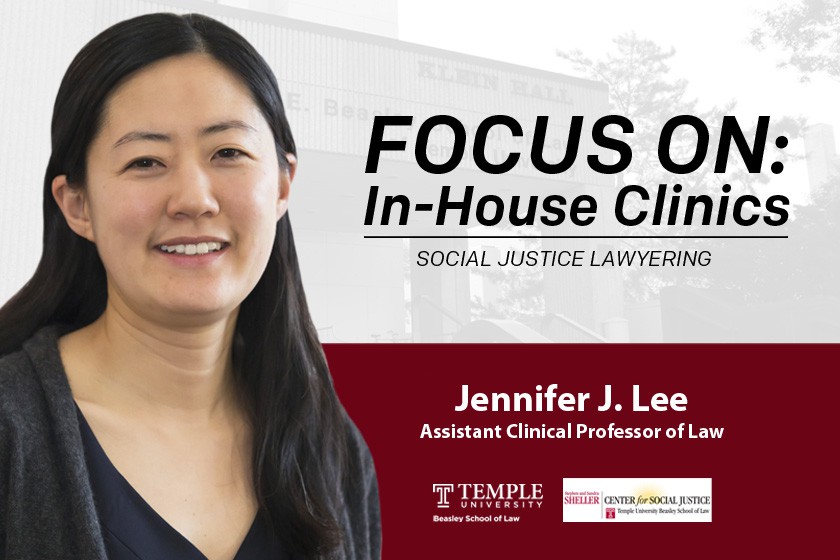Editor’s note: At Temple Law School, student advocates can hone skills, explore their professional identities, and work with community members in pursuit of solutions to real-world legal problems. We checked in with the professors who lead Temple’s in-house clinics to learn more about what they teach, and why. In this first post of the series, we discuss the Social Justice Lawyering clinic with Professor Jennifer Lee.
TLS: What is Social Justice Lawyering “about?”
Professor Lee: The Social Justice Lawyering Clinic is about learning to be a lawyer while giving back to the community. In particular, you work on real issues facing real clients, whether it’s going to court on behalf of a low-wage worker who has not been paid or designing policy proposals for a community-based organization that wants to better protect immigrants in Philadelphia.
TLS: What experiential opportunities does the class include?
Professor Lee: While there are a variety of lawyering skills that you will gain in the clinic, the most important opportunity is the ability to gain a better sense of your professional identity. In the clinic, students act as lawyers (which differs from most internships you will have over the course of your law school career). As a faculty supervisor, I provide constant support, feedback, and guidance so students can handle their own cases and projects from start to finish.
TLS: Who should take this course?
Professor Lee: This clinic is for anyone who is interested in engaging in social justice, whether or not it will ultimately be a full-time career. Further, if you’re interested in trying out diverse approaches to advocacy this clinic is for you. Each student will work on a “traditional” client case and an advocacy project where you will learn to engage in systemic reform (e.g., policy advocacy, community education). While the substantive focus of the clinic is workers’ and immigrants’ rights, the advocacy skills you learn can be cross-applied to any social justice work.
TLS: Why do you teach this course?
Professor Lee: I came to law school because, like many of you, I wanted to make a difference. After I graduated, I spent my career working for various legal aid organizations and saw the ways in which attorneys could play a role to support and empower underserved communities. While we all understand that the law creates inequalities, I hope the clinic helps students learn the tools for addressing those inequalities by persuasive advocacy.
TLS: Can you describe a time when a student made a difference for a client in one of your clinic’s cases?
Professor Lee: There are so many times when students made a difference for a client. Recently, students won an arbitration for a low-wage immigrant worker who had not been paid overtime for nearly seven years. Throughout the case, the client stated that her case was not about the money but about the injustice of how she had been treated. She didn’t want her former employer to continue to take advantage of other workers. She felt vindicated when the arbitration panel awarded her tens of thousands of dollars in back wages.
If you’re interested in trying out diverse approaches to advocacy, this clinic is for you. ~ Professor Jennifer Lee
TLS: What is one lesson you hope every student takes away after participating in your clinic?
Professor Lee: Being able to problem solve. All lawyering is ultimately about problem solving. We take a lot of time in the clinic to break down the methodology involved in problem solving, whether it is systematically lining up your evidence for a hearing or considering how to draft a one page policy fact sheet for a general audience.
TLS: What is one of the most important lawyering skills a graduate needs and how is that skill developed in your clinic?
Professor Lee: Being able to make progress in the face of uncertainty. As a lawyer, you will constantly make decisions in the face of uncertainty. In the clinic, you will consistently be forced to confront issues where there is no one right answer. Rather than be paralyzed by this uncertainty, you will develop the skills to make strategic decisions about what is the best next step to take in your case or project.
TLS: What does an average day look like in your clinic?
Professor Lee: I have a hard time saying since there really is no “average day.” You could be interviewing a client. Or you might be doing case rounds in class, which involves helping your clinic colleagues problem solve a particular challenge they are confronting in their case or project. Or you might be discussing with me how you are going to approach the investigation that you need to do for your advocacy project in a supervision meeting. Every day is different, which is what makes the clinic both challenging and interesting!

